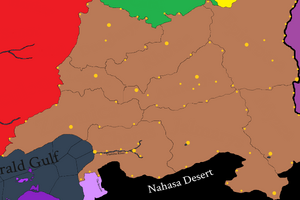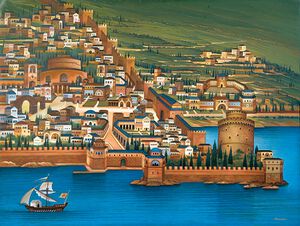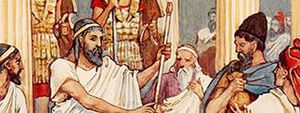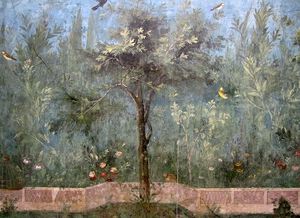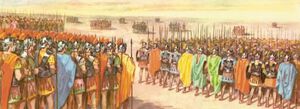Calradic Empire
The Calradic Empire (adjective; Calrad, Calradic) is the closest thing to an ancient superpower as can be found in Calradia. It's borders stretch from the grass plains of Uxkhal to the Great Steppes of the Khuzaits, and from the deserts of the Nahasa to the cold plateau forests of Sturgia and Battania. The size of this gargantuan autocracy is not to be confused with stability, however, as civil war and internal strife has sought to carve a bloody reputation within the Empire, and this it has done; for the supposedly unending military and economic strength of the Calradic Empire has been exhausted by powerhungry aristocrats and small men with big dreams. This has not prevented the rise of Phocus Macrobitius, who has proven one of the strongest and stablest of emperors in the past century. Under his rule, there have been countless incursions diverted, several unruly nobles executed and exiled and a dozen offensive campaigns against the likes of the Battanians and the Khuzaits - but there has also been the loss of Jelkala to the Vlandians. Regardless, the Empire prepares itself for what is to come, and braces for the inevitable.
History of the Empire
The Calrads are said to originally hail from the region between Jelkala and Halmar, the two cities marking the traditional heartlands of the Calrad Peoples. Not much is truly known about the founding of the empire, but it is said and claimed by the Imperial Archives that the Empire was founded by Diath-on-Earth, who is said to have loved the people of the Calrads so much that he descended from the Maker's Domain in a mortal form, known in Common as Diathus Dirimus. The single manuscript that survives from the era describing Diath as a mortal says that he befriended the King of the Calrads as a beggar and soon became such good friends with the King that he married his only daughter and heir. When the King of the Calrads perished from an illness, Diath brought a cure to all those who suffered from it, and as the new King, he led the Calrads to conquest after conquest and victory after victory. Having united the Calrads under a single banner and crushed all their foes, an elderly Diath passed away on the evening after a massive victory feast celebrating a great victory against the last remaining foes of the Empire, an occasion that is celebrated annually by the Calrads to this day, known as the Feast of Diath. It is from Diath's mortal line that all Autocrats of the Empire claim descendance from, and in times past when the Imperial Line was carefully monitored that any man that claimed the title of Emperor without having Diath's blood in his veins was considered false. Yet times change, and ever since the Empire suffered its first crushing defeat at the hands of the First Aserai, what is known as the Diathan Epoch ended, and the era of the Mortal Empire began.
The Empire has seen its fair share of failures and defeats, and many consider that the true empire ended with the Diathan Era, however the empire's second golden age began with the expelling of the First Vlandians from the Western Coast. The event is known as the Flight of the Dukes, in which the Vlando-Balish Petty-Dukes of the coast were defeated and exiled from Calradia by Emperor Rovus the Great in the year 644. The next 150 years marked the Mortal Empire's greatest years, with the Rovian Dynasty expanding the Empire's borders to their height, stretching from the falsely dubbed Eternal Bezan Sea to the endless sands of the Nahasa Deserts and from the cold tundras of Rivacheg and Wercheg to the saharas of Geroia. It is with the death of the last Rovian Emperor, Rovus VII, that the Empire's glory days slowly began to fade away. The Sturgians gained independence peacefully after the Edict of Eternal Peace was declared between the Sturgians and the Calrads, which still is upheld stoutly by the remaining Sturgian Kings, who take pride in their keeping of honor with their previous masters. The rise of the Second Aserai proved problematic as the ill-prepared Geroian Free Cities found themselves under attack by dark skinned tribes and long-bearded desert men. Known as the Geroian Crisis, it forced the Empire to permit the Geroians quasi-independence so as to allow them to raise their own armies and eventually defeat the Aserai in several indecisive battles. Yet the straw that broke the camel's back was the arrival of the Second Vlandians, who with them brought weapons that could pierce Calradic armor. The poorly defended Bezan Coast collapsed under the weight of the arrival of the Vlandians, and soon the Empire agreed to give back previously ethnically Vlandian territory.
The Empire now has found itself in yet another deadly situation, the Khuzaits have united and are baring down on Calradia, and yet another crisis following the defeats at the hands of the Vlandians in the Jaculan Wars has proven nearly too much for the Empire to manage; Yet there is still hope, the Empire is in the hands of a capable ruler, and with reserve troops from Geroia and Nahasa being imported to the Khuzait front alongside the well-trained professional troops of the Empire could prove to be enough to stop the nomad menace from ending Diath's Eternal Imperium...
Social and Political Structure of the Empire
The Empire has a very complicated social structure and makeup. The Emperor has absolute religious and political authority in the empire, its vassal states - and at times the continent. Below him, however, the structure crosses over and becomes a mess of nobles, governors and elected offices.
The Autocrat of Diath's Eternal Empire and King of the Calrads
Paramount to everything, the King of the Calrads, more commonly simply just referred to as the Emperor, dominates the politics of the empire from his capital at either Halmar or Dhirim; currently Halmar. Currently held by Phocus Macrobitius, the title dictates that the Emperor have the blood of Diath in his veins. In this case, Phocus' grandmother was the granddaughter of Emperor Tarquin the Last. The Emperor is also considered by many to be reincarnation of Diath, or that he is the Maker's Son's only representative on earth, and thus meaning that he is Head of the Makerist Faith. All Bishops, including the Vlandian ones, are forced to swear an oath of allegiance to Makerdom and Calradia before being permitted to hold their title by the Patriarch of the Faith at Dhirim...
The Greater Houses
The Greater Noble Houses of Calradia; those of Barvakar, Varadon and Thaekis, hold vast estates across the Empire, and at times outside of it. These three families dominate politics and trade, their power only equal to the Trade Guild and outdone by the Empire. They are considered to be greedy and all powerful, using their lands and resources to nothing but their own gain, fighting between the three families is a fact of daily life in many of the outer regions of the empire, where the law of the Emperor means nothing to the mercenaries and paid off bandits who ambush merchants and traders who refuse to pay protection tolls and to any who attempt to go against their interests. More recently, the Bostrum Wars proved close to catastrophic for House Barvakar after suffering a devastating military defeat at the Battle of Rapsion at the hands of the House of Thaekis.
The Trading Conglomerate and Merchant's Federation of Calradia
Known better as the Trade Guild, the Conglomerate is one of the most influential powers in the Empire if not the continent. The Federation was founded close to 200 years ago with the intention of representing Jelkalan, Dhirimite and Halmarite craftsmen and merchants. As the organization grew in power, it expanded its reach and began to buy properties to help further its funding so as to better represent its own and its members' interests. The first step was the purchase of Shariz's docks, which is completely Guild owned territory. From there, the Guild only continued to expand. Now, at the height of its power, the Federation is rich beyond common understanding and capable of fielding vast armies and navies to protect its interests against the Greater Houses and foreign threats. The Guild is currently led by Viceroy Cerres Vapson.
The Imperial Governors
Appointed as rulers of a province by the Emperor himself, these nobles act as the administrators of the region on behalf of the Emperor. The current provinces with governors in power are Shariz, Battania and the Eastern Provinces.
The Lesser Houses
These lower aristocrats, at least when compared with the Greater Houses, are the most local of the administrative positions within the empire. They are usually the nobles of a region from before the place's conquest, but can also be Purple Calrads granted land as a reward for a great deed. Phocus Macrobitius is a member of one of the Lesser Houses.
Culture of the Empire
The Calradic Empire has one of the most diverse cultures in the known world, and although the people who truly have Calrad blood running through their veins are, in truth, a minority, the many people of the Empire are interconnected and consider themselves Calradic due to not blood but tradition. There are, however, several subcultures that can be found scattered across the empire, each with their own local traditions.
The Imperial Calrads
Known also in the empire as Purple Calrads, these peoples hail from the Imperial Heartlands of Halmar, Jelkala and Dhirim and the surrounding regions. They make shrewd politicians and excellent administrators, and thus most Imperial Magistrates and Governors consist of these - as well as often making up the core of many of the Empire's professional armies. The Greater Houses are also explicitly Imperial Calrads, and as such the ordinary Calrad citizen has come to despise the Purple Calrads for the supposed stereotype that they are pompous and oppressive.
The Sharizian Calrads
An explicit minority within the Empire, these downtrodden peoples live along the Sharizian Coast. Despised for nearly a millenia for opposing Diath's invasion of the Calrad Kingdom of Shariz, which managed to defeat Diath's armies. Diath punished the Sharizians by placing the Edict of Oppression upon the former kingdom. The Edict stated that for 100 years the Sharizians would be denied their rights as children of the Maker for their insubordination and straying from the path. This the Sharizians would never forget. Nowadays, Shariz has prospered under the light the Rovian Emperors showed the region before their collapse. Phocus Macrobitius has lifted many Sharizians to high ranking positions so as to prevent a rebellion, and the Trade Guild of Calradia has recently been run by a dynasty of Sharizian Viceroys who's power has yet to displease anyone.
The Border Empire
Also named Mud-Calrads, these people consist of a mix culture of local occupied regions and foreign territories. An example of this would be the interbreeding between Imperial Calrads and Battanians in the north to form the long strip known to Calrads as The Disappointment. These mixed peoples are generally viewed upon as disgraces to the Empire, a sub-race that is to be squashed or integrated into a civilized society. Other examples include Jelkalan-Vlandians and Geroians. The Mud-Calrads are often deported from their homes to work as conscripts in the armies of the Empire or as farmers, servants and workers for the Trade Guild and the Greater Houses.
Eastern Calradia
The easternmost region of the empire, now bordering with the Khuzait Khanate, is a dangerous and extremely impoverished area. Although Easterners are not oppressed, the circumstances of the over-militarization of the east and mass drafting of villagers and townsmen into the border garrisons as well as the fact that the region is a hotbed in which the Greater Houses constantly duke it out over control of important territories and resources. A single Eastern-only territory has emerged, run by an elected Mayor; The Municipality of Narra, which has an extremely professional mercenary army to protect Narra's interests against the Greater Houses. Easterners are considered strange and foreign yet not barbaric by the rest of the empire, and valued as loyal servants and guardsmen.
The Occupied Nahasa
East of the Sharizian Coast begins the vast Nahasa Desert, ruled by tribes and clans not unlike the Aserai Desertfolk - yet not truly, for the Greater Houses have extended their grip upon the Occupied Nahasa too. These folk help trade silk and spices imported from the Aserai and into the Empire and then to the rest of the continent. They are considered valuable assets to the Empire and, despite their obvious barbarocity by Imperial standards, not oppressed like other barbarian cultures.
The Imperial Military
Work in progress..
